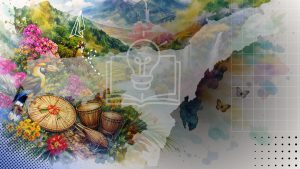NCERT Solutions for Social Civics Class 10 Chapter 1
NCERT Solutions for Class 10
Social Science (Civics)
Chapter 1– Power Sharing
1. What are the different forms of power sharing in modern democracies?
Give an example of each of these.
Answer: The different forms of power sharing are:
● Horizontal Division of Power – Sharing of power between different departments of government, example, power sharing by the executive, the Legislature and the Judiciary. Here, power sharing arrangement, different departments of government, placed at the same level use different powers. This kind of separation makes sure that none of the departments use
unlimited power.
● Vertical Division of Power – Sharing of power at different levels in a government. Example, a government for the whole country, and a government for the state. In India, it is the Central Government, State Government, Municipality, Gram Panchayat etc. The Constitution helps in laying down powers of different levels of government.
● Division of Power among different Social Groups – Power can be shared among different groups which are different from religious groups. ‘Community Government’ in Belgium is an example of this kind of power sharing. Reserved constituencies in India are also another example. This kind of arrangement is used for fair share in power.
● Division of Power among Political Parties, Pressure Groups and Movements – In contemporary democracy such a division takes the form of competition among different parties, which in turn ensures that power does not remain in one hand and is shared among different political parties representing different ideologies and social groups.
2. State one prudential reason and one moral reason for power sharing with an example from the Indian context.
Answer:
● Prudential Reason: Power sharing helps in reducing the conflict between various social groups. So, power sharing is necessary for maintaining social harmony and peace. In India, seats are reserved for weaker section.
Example: reservation of seats for SC and ST. This helps weaker sections to contribute in running the Government.
● Moral Reason: It holds the spirit of democracy. In a democratic setup, the citizens too have a stake in governance. The citizens in India come together to debate the policies and decisions of the government, this will put pressure on the government to rethink about the policies and its decisions.
3. After reading the chapter, three students drew different conclusions. Which of these do you agree with and why? Give your reason in about 50 words.
Thomman – Power sharing is necessary only in societies which have religions, linguistic or ethnic divisions.
Mathayi – Power sharing is suitable only for big countries that have regional divisions.
Ouseph – Every society needs some from of power sharing even if it is small or does not have social divisions.
Answer: Ouseph’s statement is quite logical, hence, should be agreed on. Any society requires power sharing even if it is small.
In a democratic society, members or citizens participate and acquire stake in the system. Power sharing prevents conflict between any two groups, it also generates a sense of belongingness in the society.
Power sharing helps in maintaining a balance of power in various institutions, irrespective of type of society and its size people will be satisfied where they have a role to play in decision making.
Question 4: The Mayor of Mrchtem, a town near Brussels in Belgium, has defended a ban on speaking French in the town’s schools. He said that this’ measure is in keeping with the spirit of Belgium’s power sharing arrangements? Give your reason in about 50 words.
Answer: No, this measure was not related to Belgium’s power sharing arrangements. The arrangements seek to maintain peace between the French and Dutch speaking
communities. Both French and Dutch languages will be made acceptable in town’s schools. Bilingual education system is a better way to integrate the people.
Question 5: Read the following passage and pick out any one of the prudential reasons for power sharing offered in this.
“We need to give more power to the panchayats to realise the dream of Mahatma Gandhi and the hopes of the makers of our Constitution.Panchayati Raj establishes true democracy. It restores power to the only place where power belongs in a democracy – in the hands of the people. Given power to panchayats is also a way to reduce corruption and increase administrative efficiency. When people participate in the planning and implementation of developmental schemes, they would naturally exercise greater control over these schemes. This would eliminate the corrupt middlemen. Thus, Panchayati Raj will strengthen the foundations of our democracy.”
Answer: The prudential reason for power sharing offered in the above passage is giving power to panchayats. It is a way to reduce corruption and increase administrative efficiency.
6. Different arguments are usually put forth in favor of and against power sharing. Identify those which are in favor of power sharing and select the answer using the codes given below? Power sharing:
A. Reduces conflict among different communities
B. Decreases the possibility of arbitrariness
C. Delays decision making process
D. Accommodates diversities
E. Increase instability and divisiveness
F. Promotes people’s participation in government
G. Undermines the unity of a country
| a) | A | B | D | F |
| b) | A | C | E | F |
| c) | A | B | D | G |
| d) | B | C | D | G |
Answer:
| a) | A | B | D | F |
7. Consider the following statements about power sharing arrangements in Belgium and Sri Lanka.
A. In Belgium, the Dutch-speaking majority people tried to impose their domination on the minority French-speaking community.
B. In Sri Lanka, the policies of the government sought to ensure the dominance of the Sinhala-speaking majority.
C. The Tamils in Sri Lanka demanded a federal arrangement of power sharing to protect their culture, language and equality of opportunity in education and jobs.
D. The transformation of Belgium from unitary government to a federal one prevented a possible division of the country on linguistic lines.
Which of the statements given above are correct?
a) A, B, C and D
b) A, B and D
c) C and D
d) B, C and D
Answer: Option d) B, C and D
8. Match list I (forms of power sharing) with List II (forms of government) and select the correct answer using the codes given below in the lists:
| List I | List II |
| 1. Power shared among different organs of government. | A. Community government |
| 2. Power shared among governments at different levels. | B. Separation of powers |
| 3. Power shared by different social groups | C. Coalition government |
| 4. Power shared bt two or more political parties | D. Federal government |
| 1 | 2 | 3 | 4 | |
| a) | D | A | B | C |
| b) | B | C | D | A |
| c) | B | D | A | C |
| d) | C | D | A | B |
Answer:
| 1 | 2 | 3 | 4 | |
| c) | B | D | A | C |
9. Consider the following two statements on power sharing and select the answer using the codes given below:
A. Power sharing is good for democracy.
B. It helps to reduce the possibility of conflict between social groups.
Which of these statements are true and false?
a) A is true but B is false
b) Both A and B are true
c) Both A and B are false
d) A is false but B is true
ANswer: Option b) Both A and B are true.
Study materials
- Refernce Books
- NCERT Solutions
- Syllabus









